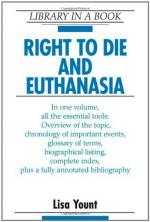|
This section contains 2,329 words (approx. 8 pages at 300 words per page) |

|
Agata A. Bednarz
About the author: Agata A. Bednarz is a medical student at the University of Rochester in New York.
It is ultimately respect for the autonomy of the terminally ill patients that makes it ethically acceptable to withdraw life support from them. Having endured long months of pain and suffering with no hope of relief, these patients should have the physician's support when choosing to end their lives. Physicians who insist on keeping such patients alive are breaching the principle of nonmaleficence (doing no harm). In addition to being ethical, the removal of life-sustaining treatment is not considered an act of physician-assisted suicide and thus is perfectly legal. The refusal of treatment is not a privilege but a right of the terminally ill.
Through the cobwebs...
|
This section contains 2,329 words (approx. 8 pages at 300 words per page) |

|




